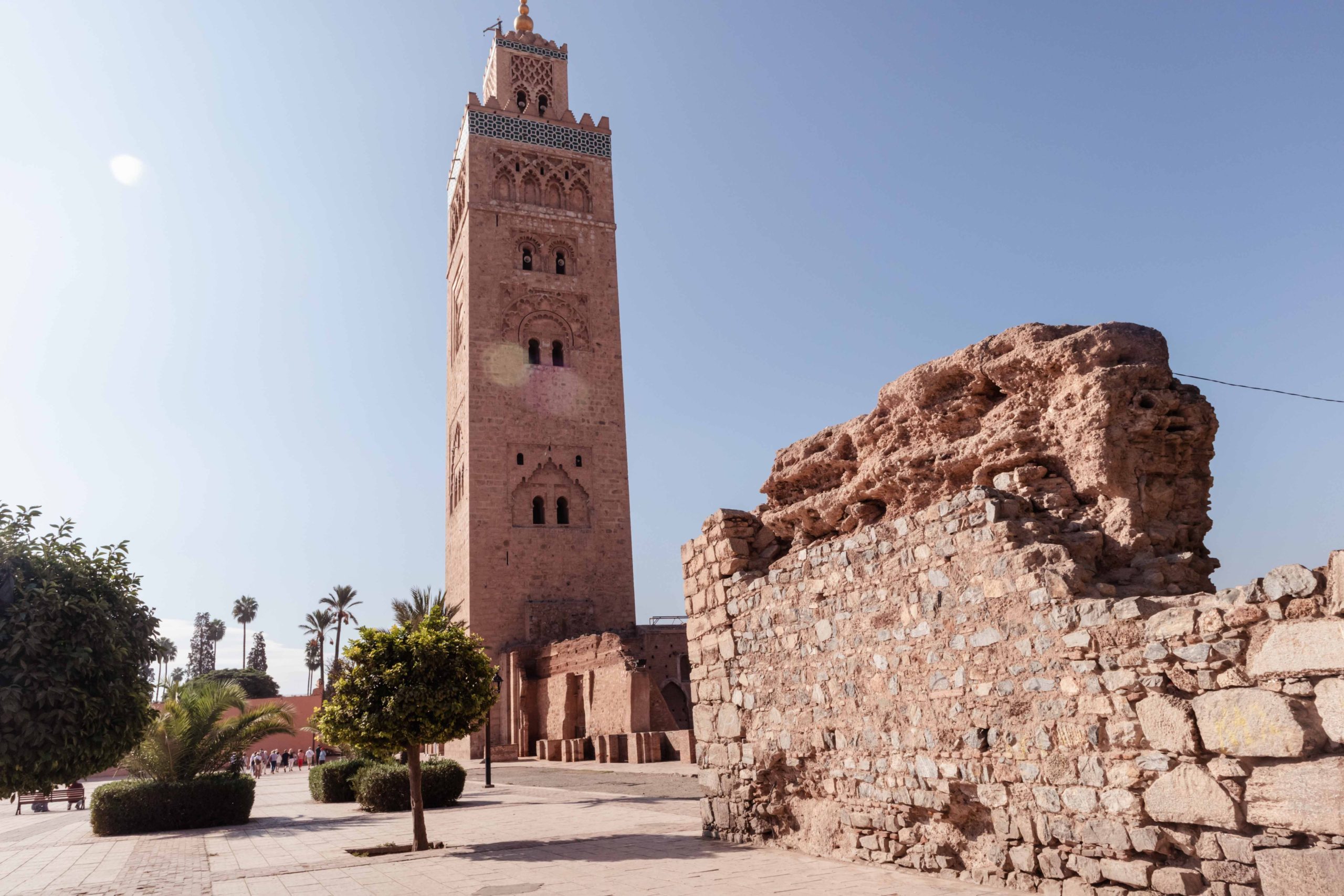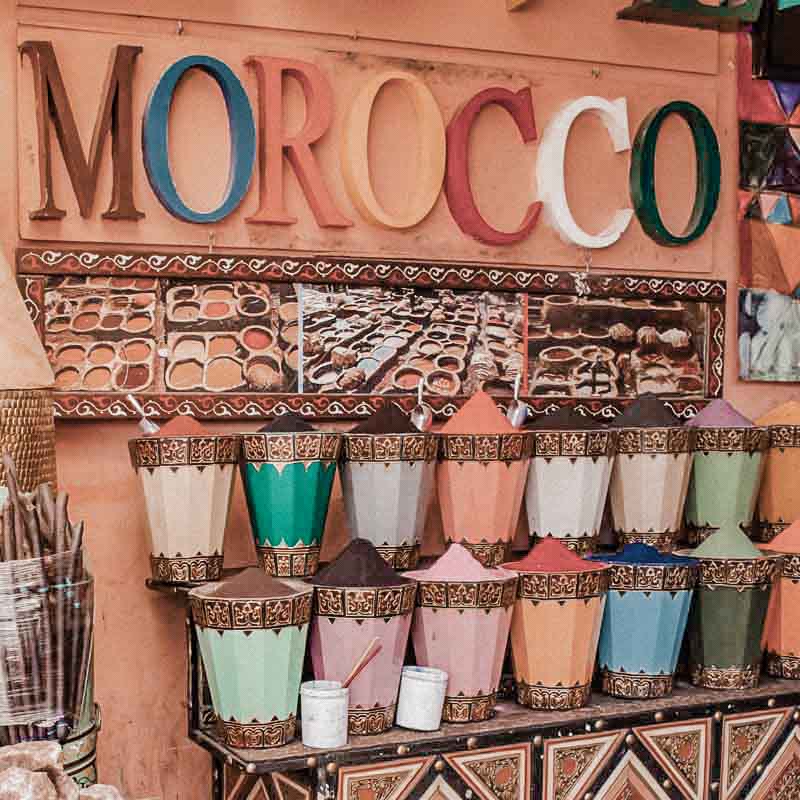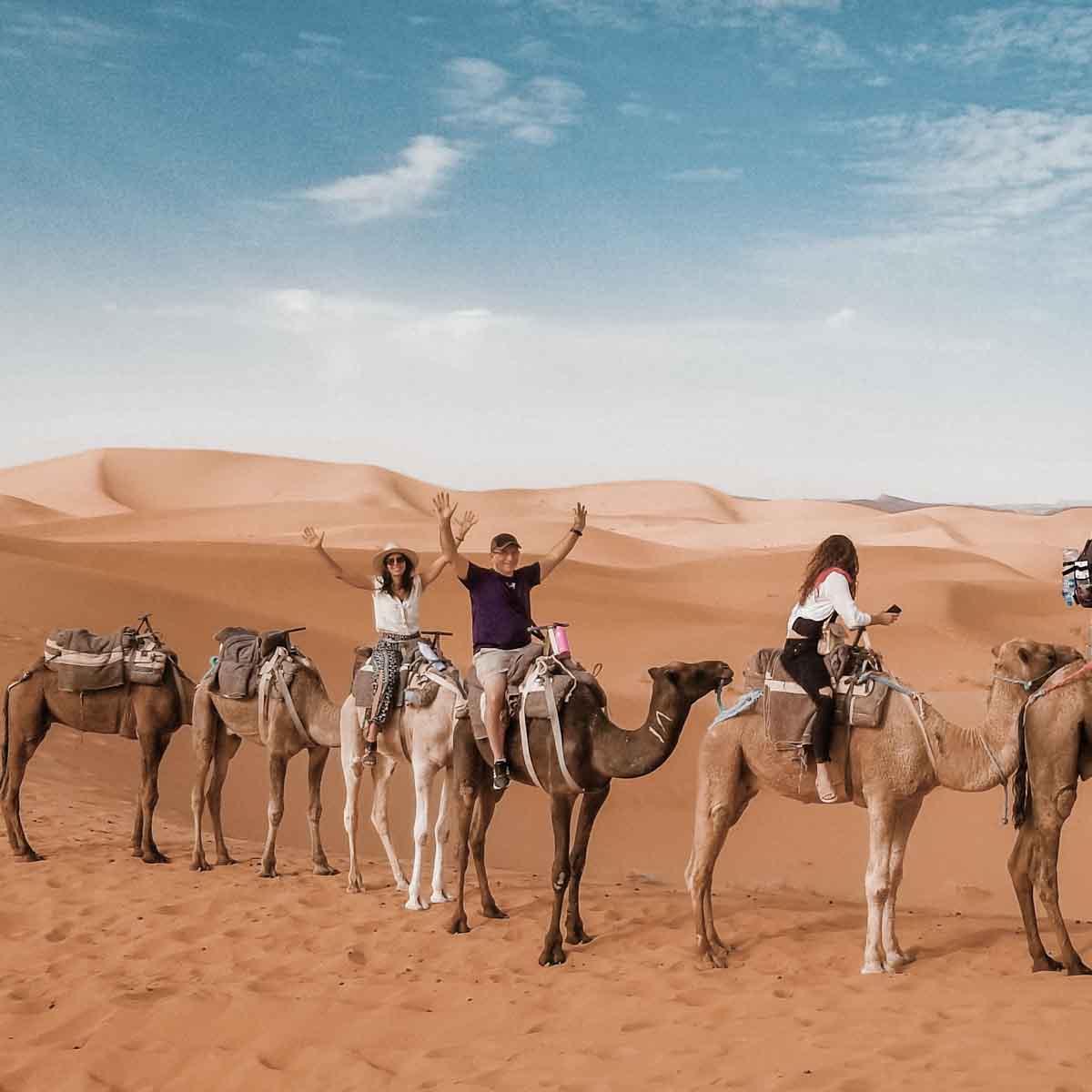Morocco
Morroco is a delight to all of the senses and should be high on your list of exotic destinations. The Kingdom of Morocco’s location is in the Maghreb region of North Africa. It has much to offer the tourist who is looking to travel to an easily accessible and truly unique destination. With the Mediterranean Sea to its north, the Atlantic Ocean to the west, Atlas Mountains and the Sahara Desert, this country offers visitors a diverse exotic landscape rich in beauty and culture.
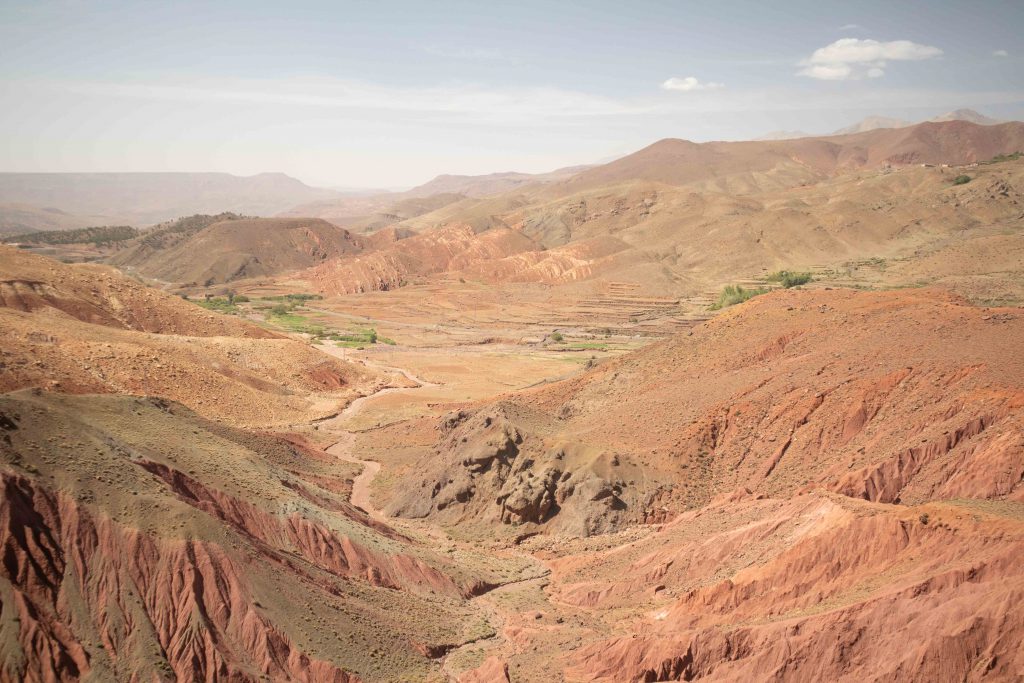
The capital of Morocco is Rabat, and Casablanca is the largest city. Morocco spans an area of 710,850 km (274,460 sq mi) and has a population of over 35 million.
The indigenous residents were the African Berber tribes who still inhabit much of the country. Morocco was conquered by the Arabs in the 7th century spreading Islam- which is currently practiced by 99% of the nation’s residents.
Over the years, parts of Morocco were occupied by the Spanish and French, gaining its independence in 1956. The strong influence of French and Spanish is apparent in regions of the country.
The modern kingdom of Morocco is ruled by King Mohammad Vl of the Alaouite dynasty. Although becoming modern in many ways, Morocco maintains much of its ancient architecture and traditional customs.
Highlights in Morocco
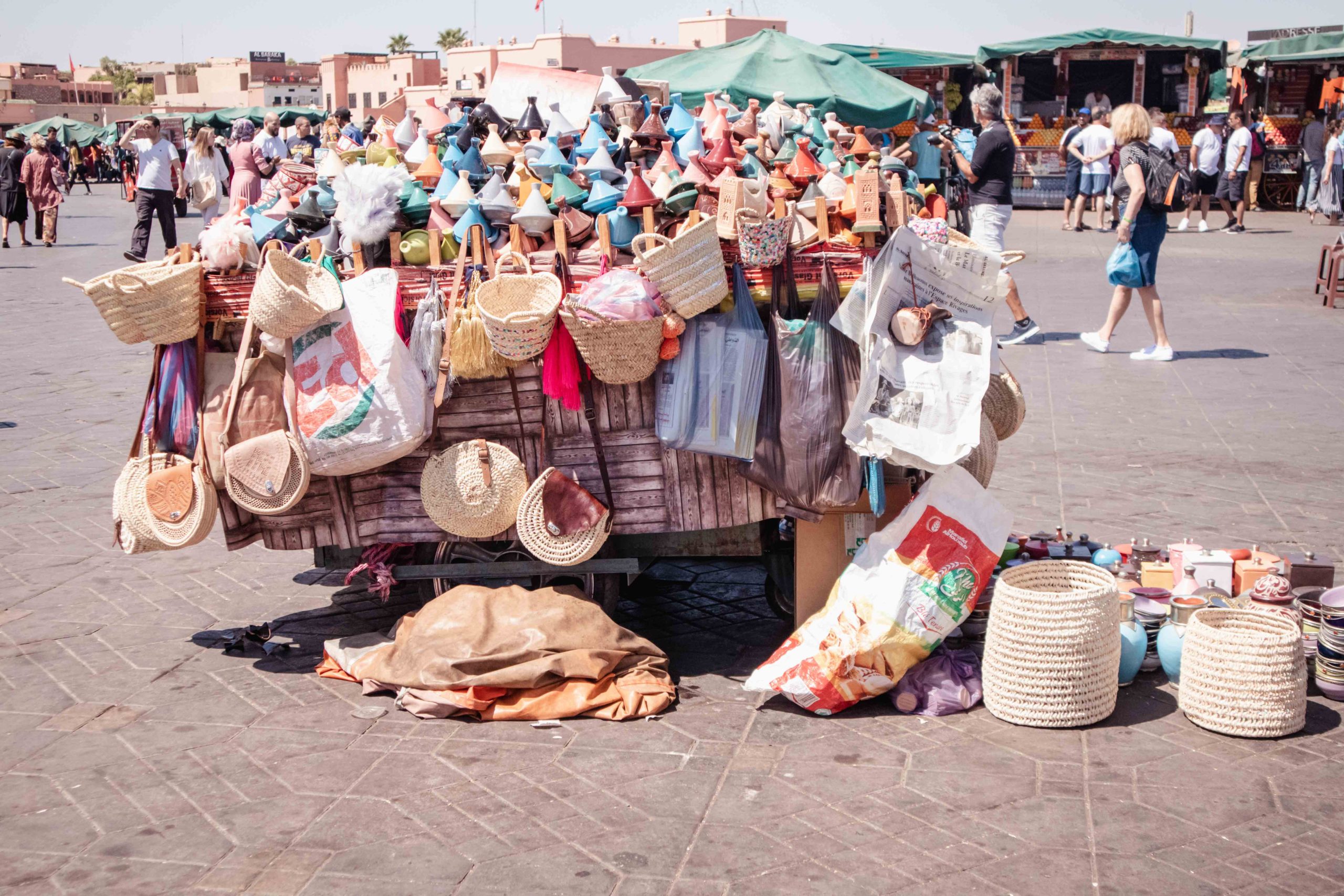
“The Market Square”
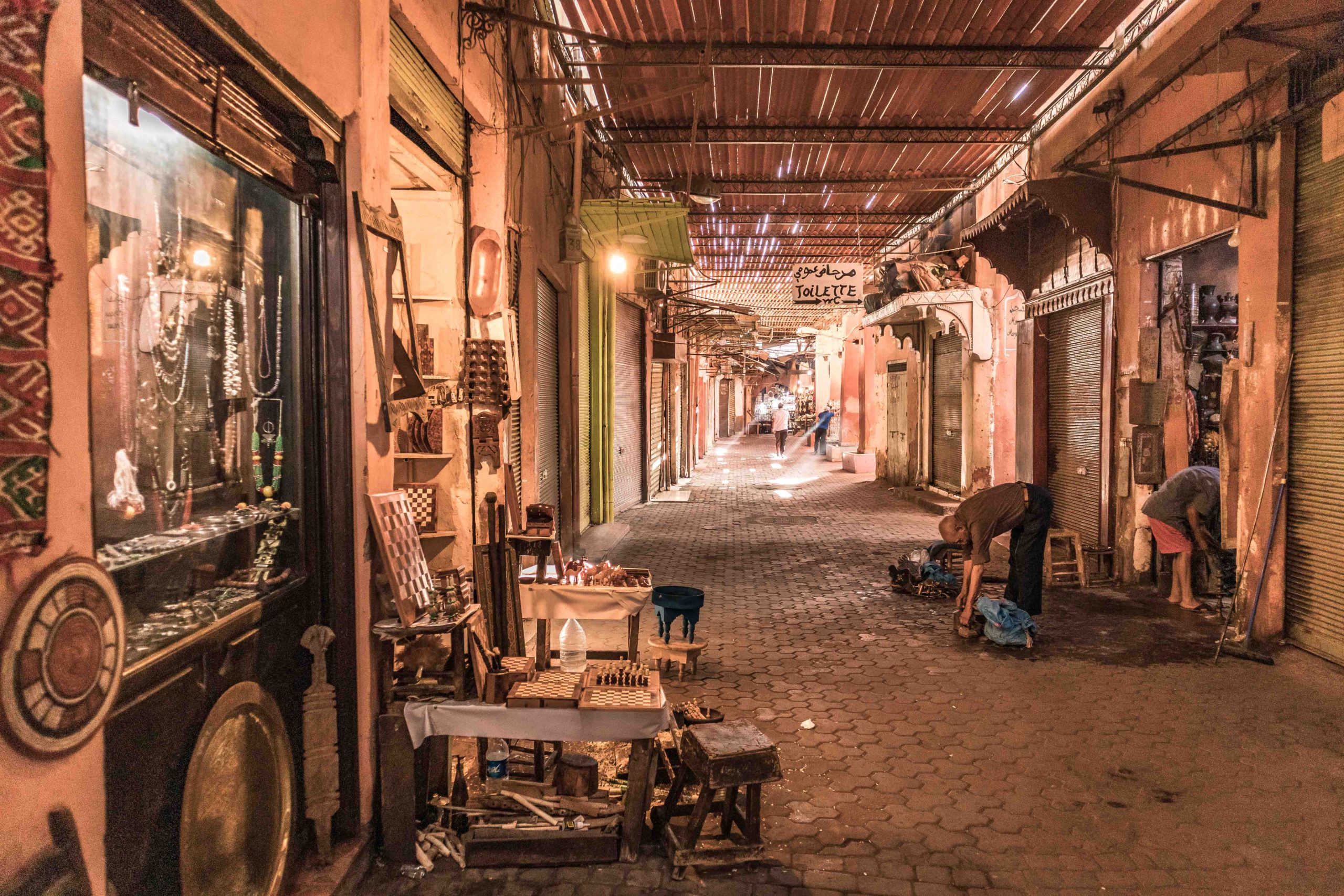
“Seeing the Souks”
What to Know Before You Go
Climate
Because of the diverse landscape, temperature and precipitation vary considerably throughout the country. The coast receives a moderate Mediterranean like weather while the mountains can have snow, and rainfall amounts up to 2030 mm (80in). Summer temperatures in the desert can be extreme, rising to 41C (105F). Checking average temperatures for the regions you plan to visit is essential to be prepared for your trip.
Language
The indigenous Berbers of Morocco have their own Berber language, usually spoken at home and socially amongst themselves. Children are taught Arabic in school, and most are taught French as they get into the middle grades. It is not unusual for the locals to speak several languages, including English and Spanish– especially if they are in the tourist industry.
Time Zone
Morocco is in the Western European time zone, which translates to GMT+1 (Greenwich Mean Time +1) This is the same time zone as several other European countries such as Portugal, Ireland, and the United Kingdom.
Immunization Recommendations
The Center for Disease Control and the World Health Organization recommends the following vaccinations for Morocco: hepatitis A, hepatitis B, typhoid, rabies, meningitis, polio, measles, mumps, and rubella (MMR), Tdap (tetanus, diphtheria, and pertussis), chickenpox, shingles, pneumonia, and influenza.
Visa Requirements
Travelers carrying a valid passport from countries in North America and Europe do not need a VISA to enter Morocco if their stay does not exceed 3 months. Passports must be valid for 6 months from the time you enter Morocco. Be sure to check the Moroccan Embassy website for visa requirements for your specific country as you plan your trip.
Currency/ Credit Cards/ ATMs
The Moroccan Dirham (Dh) is the official currency of the country. Use this link to get information on current exchange rates to other currencies. Be sure to keep an adequate amount of Dirhams on you for meals and day to day transactions. Major credit cards are also excepted in most hotels, riads, and better restaurants. Euros are also commonly used. ATMs are widely available even in many smaller towns in Morocco.
Food Customs
Moroccan cuisine is diverse and rich in color and flavor. It’s strongly influenced by several other cultures, including the traditional African, middle eastern, and European, providing a unique combination of spices and flavors that are bound to appeal.
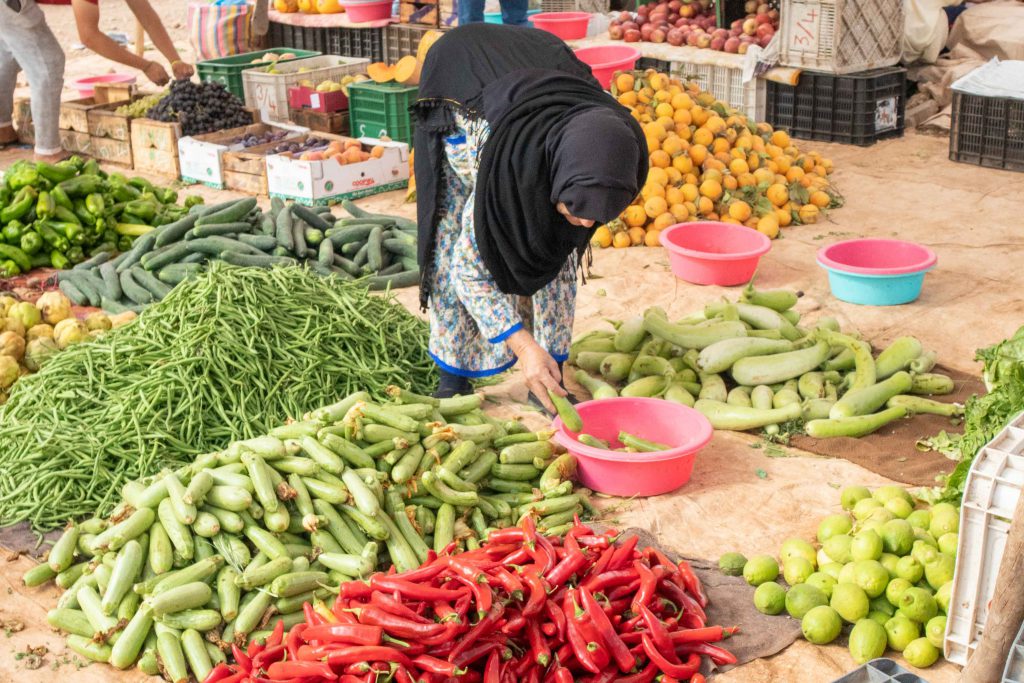
Moroccans are extremely hospitable. Upon entering a home or even your riad, it is customary that you will be offered some traditional Mint Tea. Mint tea is served in almost a ceremonial way with a teapot filled with mint leaves and sugar or honey, boiling water and steeped for several minutes. It is then poured into glasses from a height of 12 inches or more. Moroccans enjoy their tea several times a day.
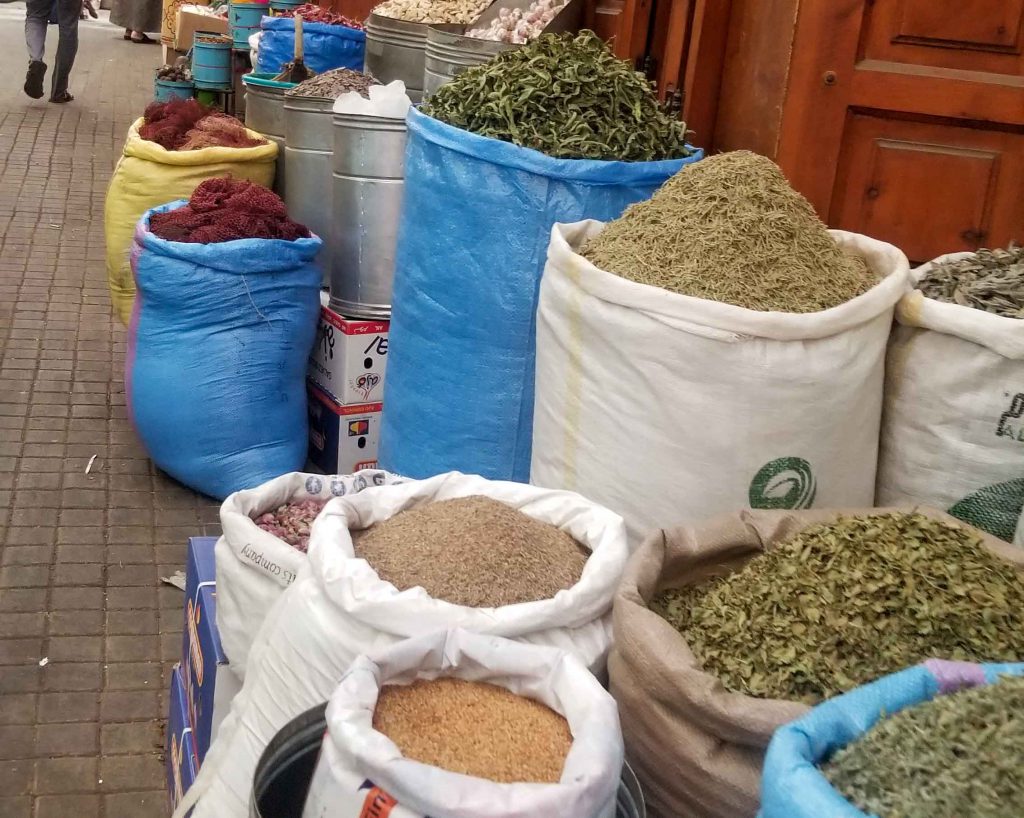
Alcohol is legal in Morocco but sometimes hard to come by. Moroccans who drink usually do so privately – not in restaurants or bars. Some restaurants cater to tourists and do serve; however, they may be hard to come by depending on your location.
Couscous is the national dish of morocco. Usually steamed and served with vegetables, lamb, beef, or chicken. Historically this dish is served on a communal plate and scooped up with bread.
Tagine takes its name from the traditional triangular-shaped clay pot that this flavorful stew is made in. An endless variety of meat, vegetables seasoned with onion, garlic, cumin, and other spices are slowly cooked over an open flame.
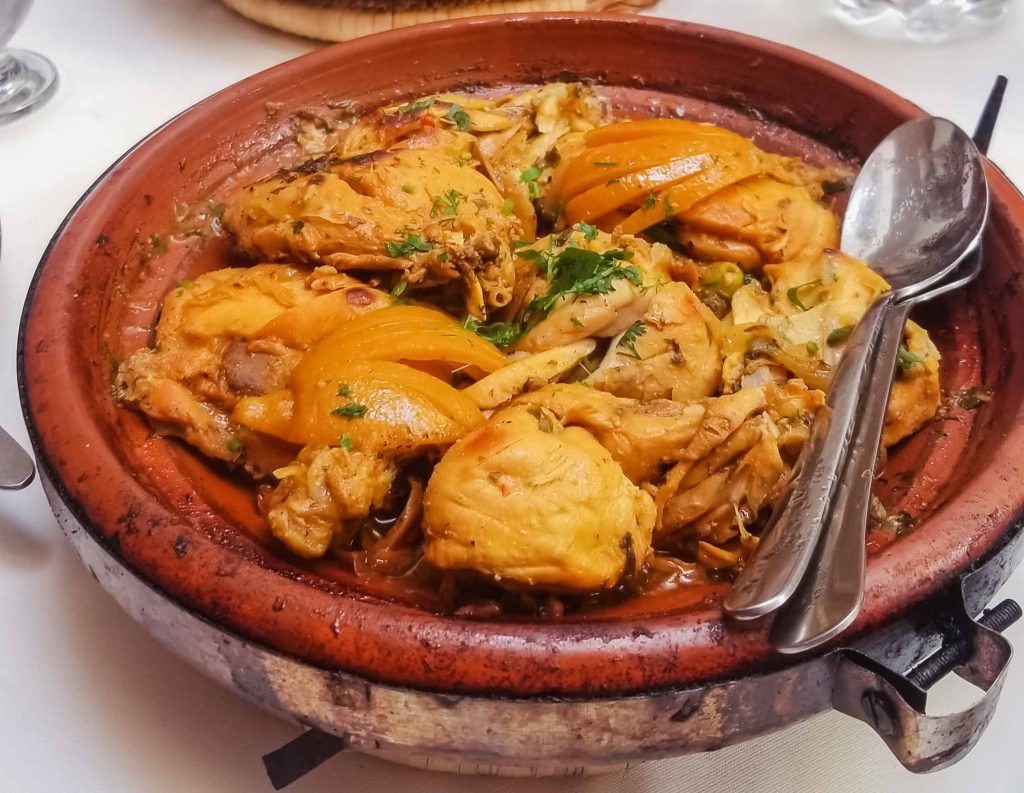
Chicken Bastilla – traditionally made with pigeon is a sweet and savory pie using saffron, ginger, cinnamon, honey, and topped with a filo pastry dough is a favorite amongst locals and tourists alike.
Tips/Bargaining
Haggling and bargaining is part of the Moroccan souk experience. Especially with tourist-related purchases. Expect to end up paying about 2/3 to ¾ of the initial asking price.
Tipping is customary in Morocco. The following are guidelines to follow that will help out in most situations.
- Baggage handlers Dh5
- Tour guides 15%
- Porters Dh10 to Dh20
- Public-toilet attendants Dh1 to Dh2
- Restaurant servers 10%
Transportation
Taxi drivers are known to take advantage of tourists. When traveling from the airport to your riad or hotel, contact your riad in advance to let them know that you will need transportation. They will either connect you with a third party company that you will pay in advance, or they will arrange it and add the cost to your bill. The taxi’s outside the airport will try to charge you many times what these transportation companies do. During your stay, If you are staying in the media, walking is your best option. “Google Maps” is semi-reliable in these tight mazes, but you will require a data plan if you plan to use it.
Allow extra time for getting lost as this is bound to happen. It’s never a good idea to ask for directions as there are many hustlers on the streets trying to make a few bucks by steering you to a friend’s shop or helping you out and expecting to get paid. There is a good chance that you will be sent in the wrong direction. If you’re stuck and need directions your most reliable option is to ask a shop owner where you have done some business.
If you are going somewhere that requires driving, ask a host at your riad to arrange transportation. They are pleased to help. Always carry or snap a picture of your riads business card so that you know what address to return to.
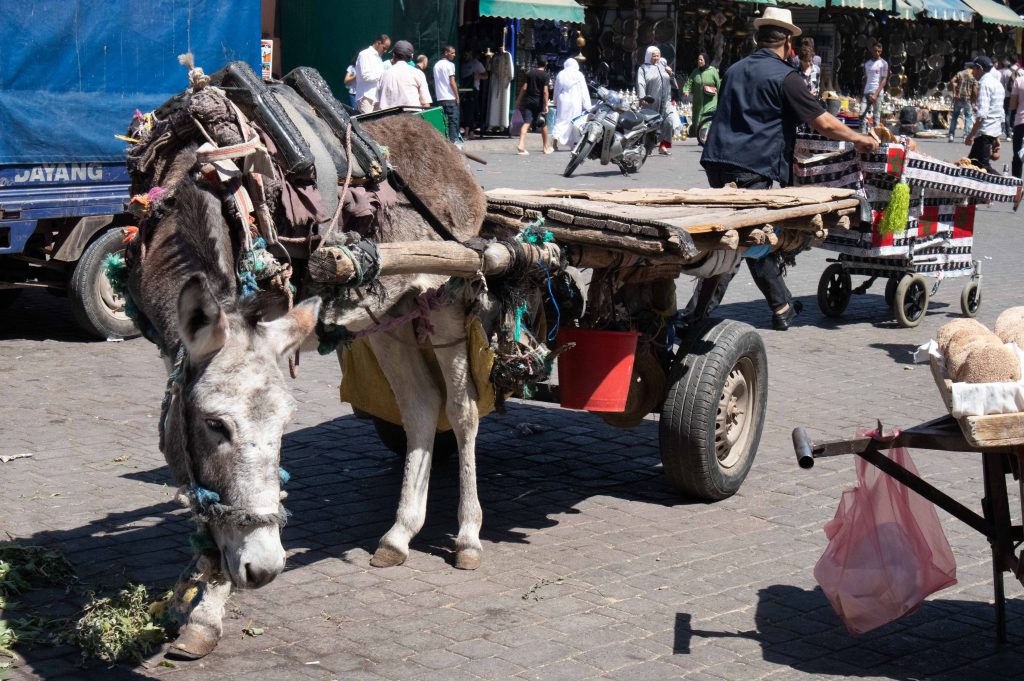
Safety
Generally, violent crime rates in morocco are relatively low. They do, however, have their share of pickpocketers, petty thieves, and con artists in crowded areas, so it is essential to always be on alert. Women traveling alone may experience stares and rude comments, but typically no more than on the streets of New York City.
These bustling streets will also be full of crafty hustlers acting like tour guides wanting to help you or direct you to your destination. They will ask you where you are going and then inform you that that restaurant, square or shop you are looking for, is closed today and that you should follow them. They will inevitably take you to a shop where you may be pressured into listening to a sales pitch. You may be offered a free gift at a shop and then be accused of stealing it and issued a fine.
My husband and I were dropped off just outside the medina in Marrakech about 50 meters from our riad. Two young men were there, asked us what riad we were staying at, and told us that they were from there. They took our bags and then demanded 5 euros each for the one minute walk with our bags. This is equivalent to 50 Moroccan Durhams. An astronomical amount of money for a bag handler. They were getting loud and agitated when we tried to pay them less, so we paid the full amount. Lesson learned…
If you wish to take a photo of someone, ask first. Many Moroccans do not want to be photographed, and others are willing for a fee. You may also be expected to pay a fee to someone owning an animal or shop that you have snapped a picture of. Always ask first and agree on the amount beforehand to avoid the demands of unreasonable amounts of money. The best thing to do when approached by anyone on the street is to politely say “no thank you,” look the other way and keep walking.
Food and Water Safety
It is unlikely that you will get sick in restaurants frequented by tourists. Street food, however, may not be prepared in the conditions that your stomach is used to. Unless you are with a trusted guide who assures you that the food from a particular vendor is safe for visitors, street food should be avoided. Guides are very keen on getting great reviews, and a claim of food poisoning from an unhappy guest would not be good for business. Bottled water is advised and avoid uncooked fruits and vegetables that you cannot peel.

Electricity
The electrical grid in Morocco provides standard 220 V power on a 50 Hz frequency. This is the same as many European and Asian countries. Many of your devices and small appliances will be compatible with this power standard. It is very important that you check the compatibility with these power specifications or you risk damaging your gear. The electrical outlets used in Morocco are what are known as “Type C” or “Type E” outlets. See the image below for the actual shapes of these plugs and outlets. You may require an outlet adaptor or power converter if you are traveling from a locale that uses a different standard.
You can find more complete information by checking out our travel tips post “Shedding Light on Electricity“.
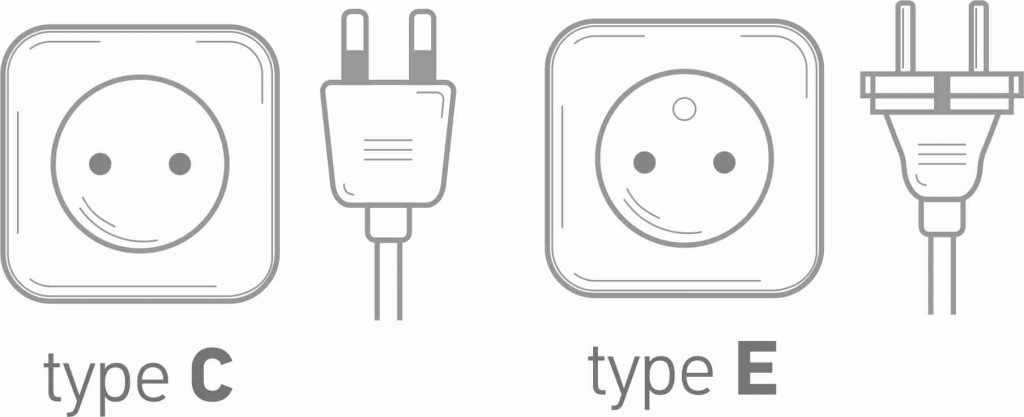
Customs & Traditions
Morocco is considered a liberal Muslim country. It may be liberal by Muslim standards, but it is quite conservative by western standards. This male-dominated society is apparent, with most women working in the home caring for the large families and helping in the fields. Most businesses and shops are operated by men. The younger generation seems to be changing, and young women are starting to choose careers – especially in the bigger cities.
Local Muslim women will be dressed in various degrees of modesty ranging from modest western clothing to full burkas and everything in between. Morocco is a tolerant country, and Moroccans have grown accustomed to seeing western tourists dressed in more revealing clothes; however, I think it is respectful to dress on the modest side. Shoulders covered and pants, dresses, shorts, or skirts at or below the knees.
Local men’s dress also varies, ranging from full-length thobes, kaftans with caps to jeans and t-shirts. Closer to the dessert, more traditional Berber clothing, including turbans of various colors.
If you are within earshot of a Mosque, you will hear the call to prayer. This is a central part of their daily lives and can be heard loudly 5 times daily, including once before sunrise. The exact times the message will be voiced over the loudspeaker will vary based on daylight hours and the positioning of the sun. As someone who has respect and curiosity for all cultures and faiths, I enjoyed this experience.
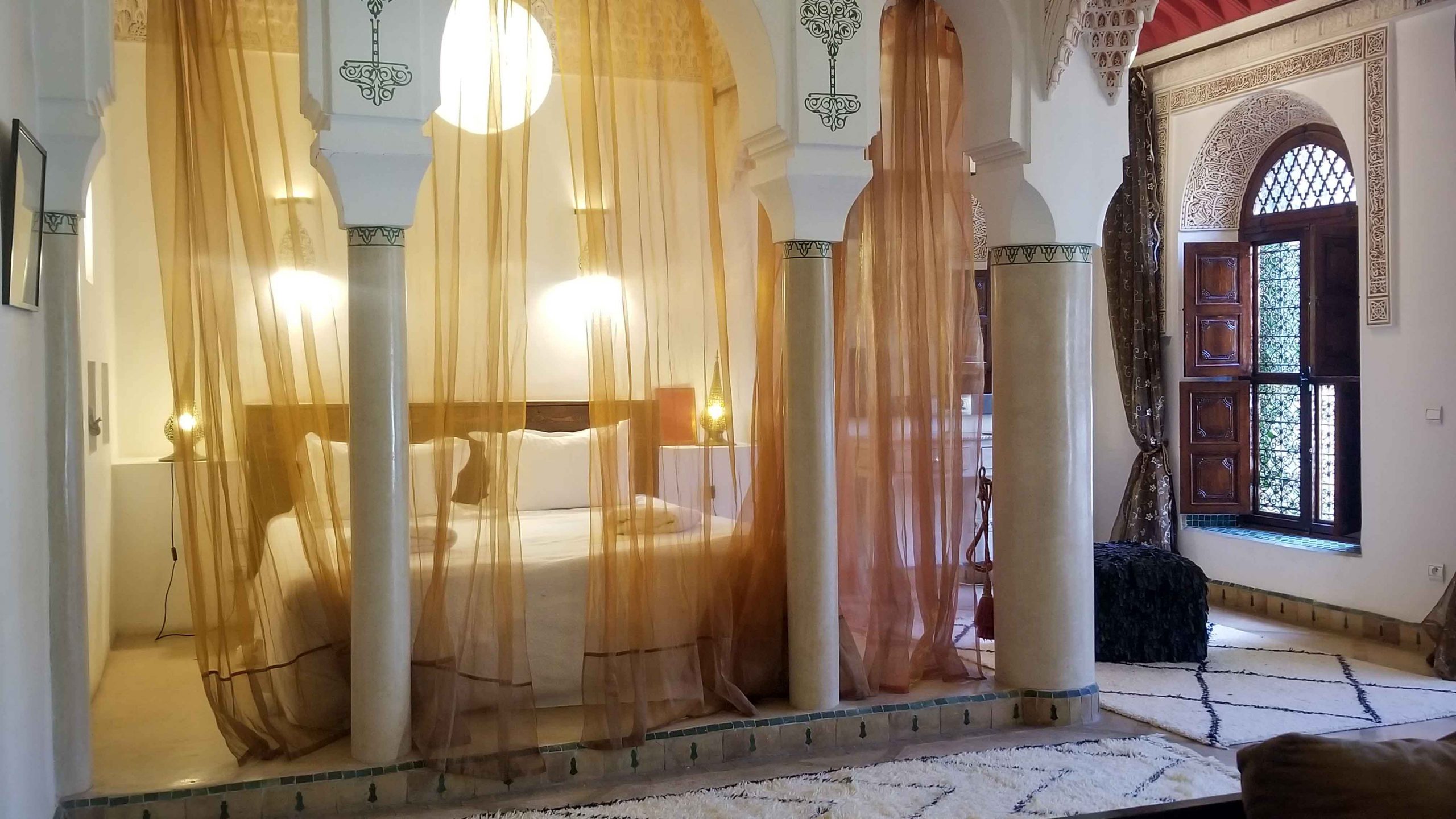
A Few Words and Phrases:
Hi – Marhabaan or Salam
Bye – Wadaeaan
Please – Raja
Thank you – Shukrran
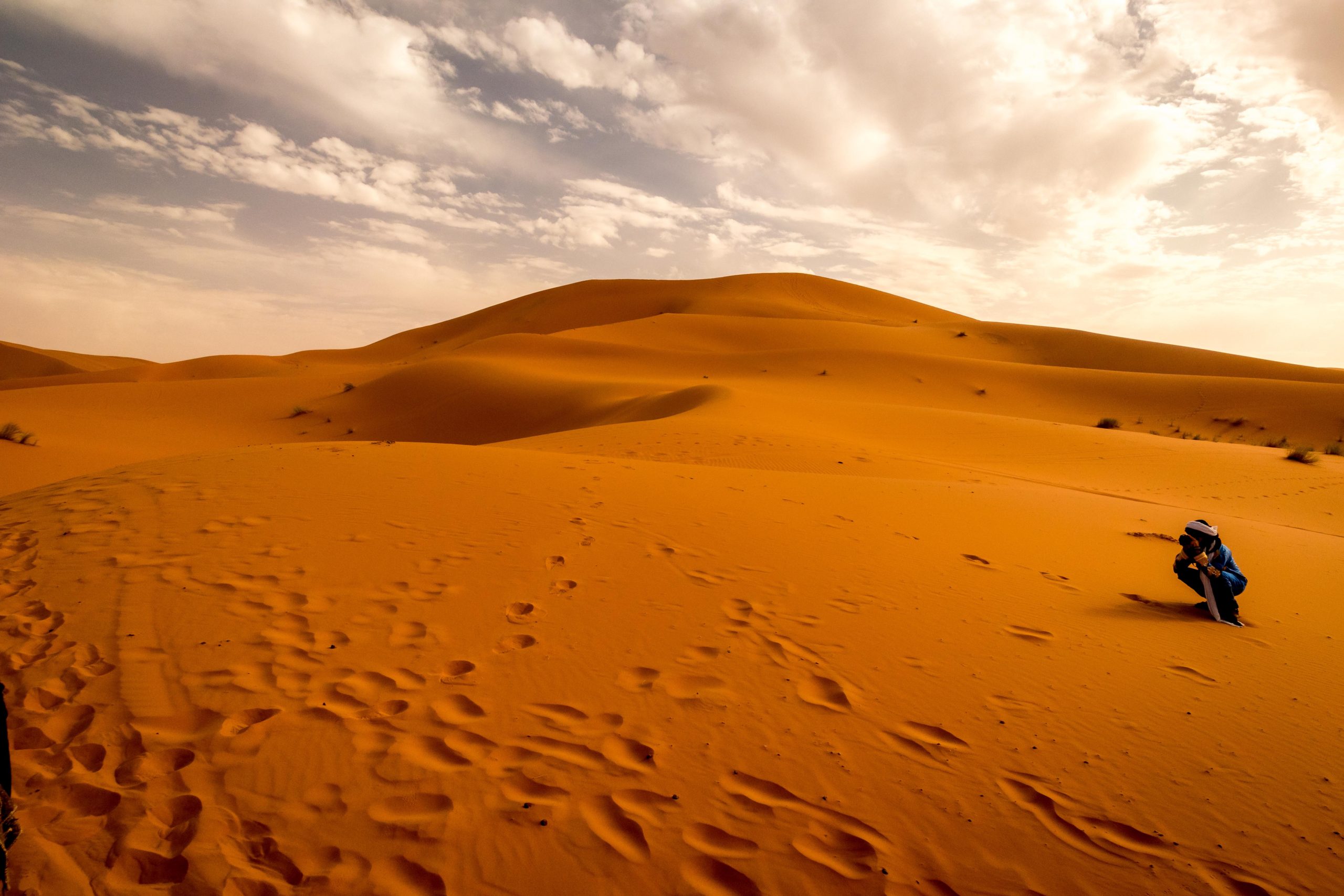
Places to Go & Things to See
-
A Few Days in Marrakech
Step back in time into the Imperial City of Marrakech, home to mosques, palaces, gardens, and souks. A trip into the medina takes you to a traditional marketplace that has enchanted visitors for almost a thousand years.
-
A 3-Day Sahara Desert Tour
Travel through the high Atlas mountains and step into a scene from Lawerence of Arabia as you tour the Sahara sand dunes. Spend an evening with the locals and sleep in the desert in luxurious camping accommodations.
November 17, 2019

